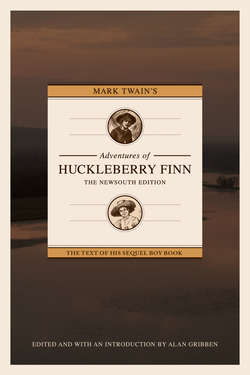Mark Twain's Adventures of Huckleberry Finn

Реклама. ООО «ЛитРес», ИНН: 7719571260.
Оглавление
Alan Gribben. Mark Twain's Adventures of Huckleberry Finn
Contents
Editor’s Introduction: The NewSouth Edition of Adventures of Huckleberry Finn
Selected Relevant Print and Digital Works
Twain’s Chapter Headings
Chapter 1
Chapter 2
Chapter 3
Chapter 4
Chapter 5
Chapter 6
Chapter 7
Chapter 8
Chapter 9
Chapter 10
Chapter 11
Chapter 12
Chapter 13
Chapter 14
Chapter 15
Chapter 16
Chapter 17
Chapter 18
Chapter 19
Chapter 20
Chapter 21
Chapter 22
Chapter 23
Chapter 24
Chapter 25
Chapter 26
Chapter 27
Chapter 28
Chapter 29
Chapter 30
Chapter 31
Chapter 32
Chapter 33
Chapter 34
Chapter 35
Chapter 36
Chapter 37
Chapter 38
Chapter 39
Chapter 40
Chapter 41
Chapter 42
Chapter the Last
Afterword
About the Editor
Отрывок из книги
Mark Twain’s
Adventures of Huckleberry Finn
.....
In a semi fictional work, Green Hills of Africa (1935), Ernest Hemingway’s narrator made an astute and widely quoted pronouncement about Huckleberry Finn. The key element in this opinion was the word “modern”: “All modern American literature,” Hemingway’s character declared, “comes from one book by Mark Twain called Huckleberry Finn. . . . All American writing comes from that. There was nothing before” (italics added). Hemingway had noticed a momentous difference between Twain’s novel and its literary precursors. In “modern” literature, as opposed to much British and American fiction of the nineteenth century, the reader is no longer coached regarding what to think of the characters and their actions. This prior type of moral guidance had typically been threaded obliquely throughout the paragraphs of a novel, or else summarized overtly at the end of a chapter or a short story.
In contrast to this previous view of the author’s role as both narrator and interpreter, Twain devised a narrator so young and inexperienced that he often cannot quite figure out what he is describing. That is the case, for instance, in Chapter 22 when Huck sneaks into a circus and relates how an intoxicated man staggers out of the audience and demands a chance to ride one of the performers’ horses. The crowd hoots and jeers at the drunk’s interruption of the show, until the ring-master reluctantly gives in and allows the man to mount one of the animals. At first Huck is fearful for the man’s safety as the trained horse races around the ring at faster and faster gaits, with the helpless man “hanging onto his neck, and his heels flying up in the air.” Then Huck (along with the crowd) is astonished when this “sot” suddenly stands up on the galloping steed, sheds layers of clothing “so thick they kind of clogged up the air,” and reveals himself to be “slim and handsome” in an acrobatic costume that was “the gaudiest and prettiest you ever saw.” Immediately he “lit into that horse with his whip and made him fairly hum.”
.....